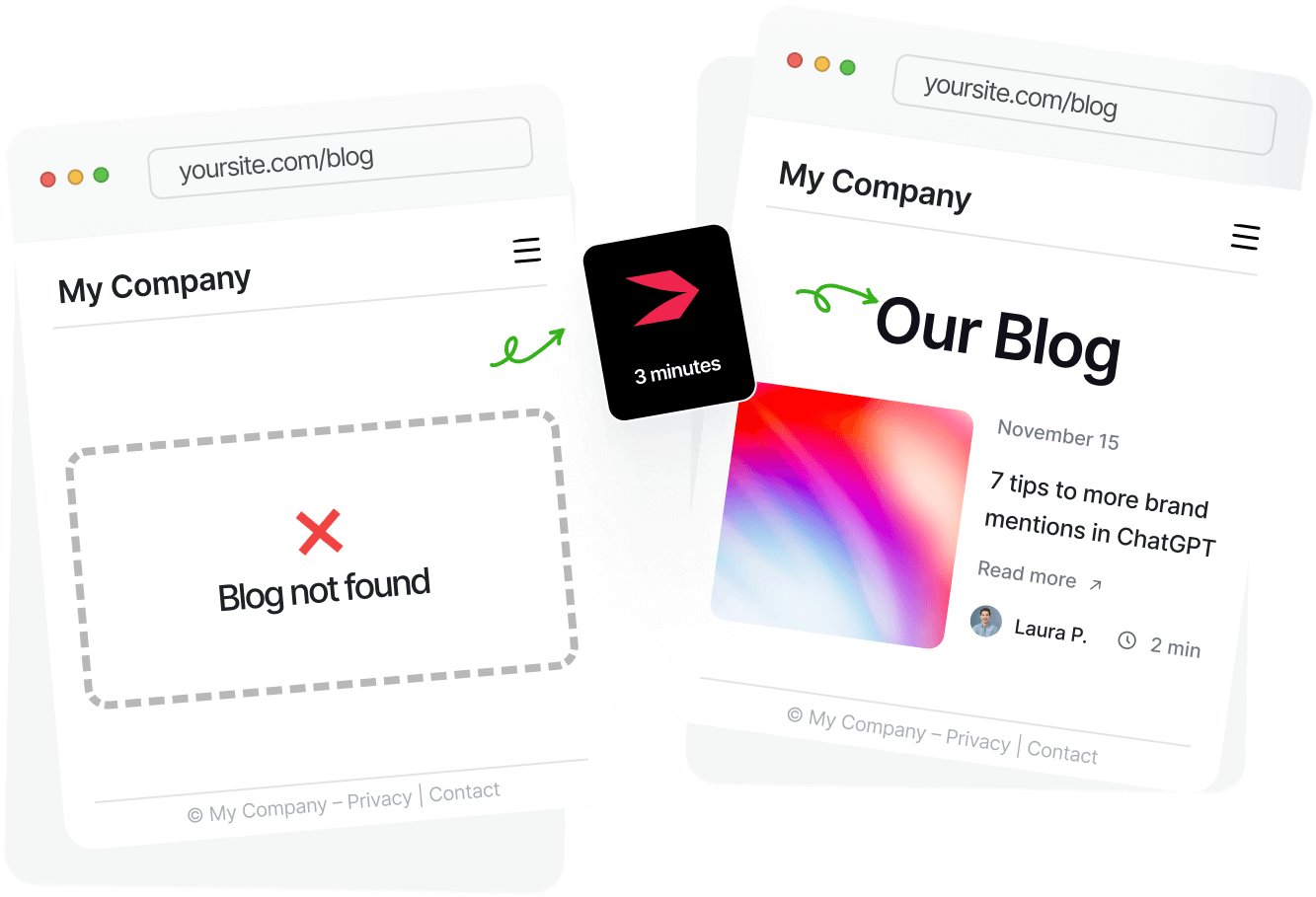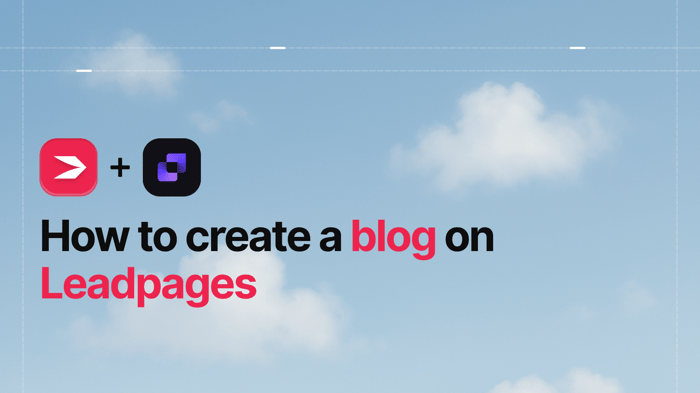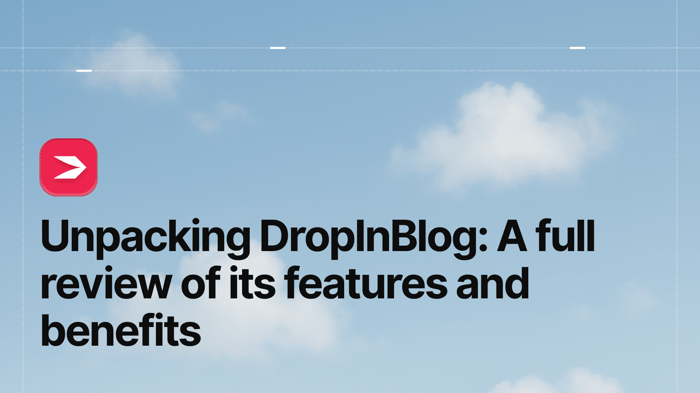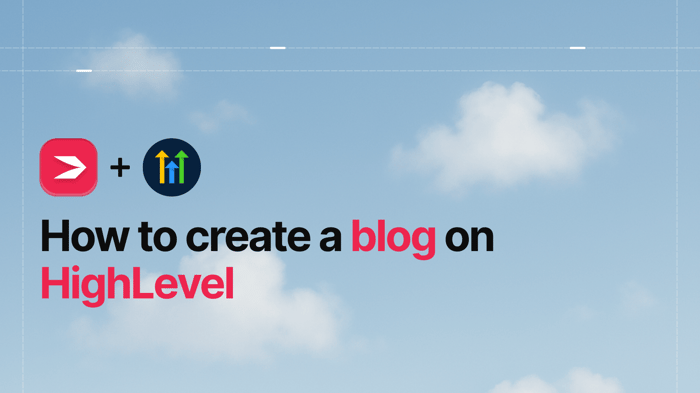A HighLevel vs. Leadpages comparison is not exactly an apples-to-apples comparison. These platforms are structured differently and do different jobs. However, they have something in common: they are built for marketers and they help businesses with lead conversion. This gives us sufficient room for comparison, so we can see how they measure up against each other.
First, we’ll take a quick look at what HighLevel and Leadpages are in general terms, after which we’ll investigate 3 important facets of these platforms, or for that matter, any other sales and marketing platforms: price, notable features (at least some of them), and customer support.
So, let’s dive into it.
Table of Contents
What Is HighLevel?
HighLevel is primarily a platform for marketing agencies. It’s definitely not well-suited for beginners. It gives its customers a full suite of sales and marketing tools, putting a special emphasis on CRM. With HighLevel, you have everything necessary to help your clients run their businesses successfully, especially their business communication, under one roof.
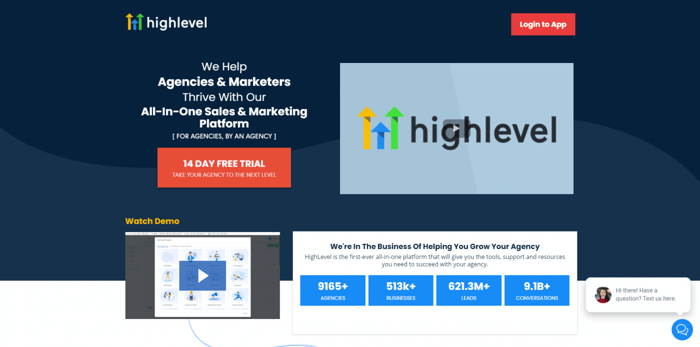
What Is Leadpages?
Leadpages is not a one-stop sales and marketing platform like HighLevel. It’s mostly used for building landing pages and capturing leads. It’s simple and economical, which makes it great for entry-level users. Usually, it’s used together with other types of software. When used in this way, as a part of a larger sales and marketing strategy that includes diverse software, it’s a precious instrument in an entrepreneur's toolkit.
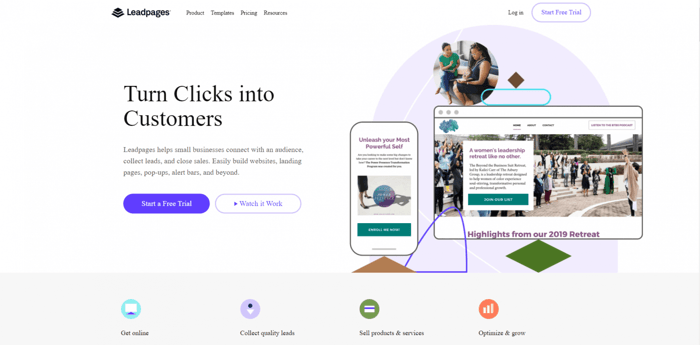
Price
HighLevel
At first glance, HighLevel doesn’t look cheap. However, when we take everything it offers into account, it’s extremely cost-effective and economical.
There are 2 HighLevel accounts or plans:
1. Agency Starter Account: $97/month, which includes one account, Twilio – an out-of-the-box communication integration that enables two-way texting, and Mailgun – another communication integration that lets you send unlimited emails.
2. Agency Unlimited Account: $297/month, which contains the features from the previous plan, unlimited sub-accounts (each of your clients can have their own account at no additional costs, which is next to impossible to find elsewhere), and a fully branded and customizable desktop app.
There’s one more option: an upgrade on top of the Agency Unlimited Account. Its name is a bit long – White Label Mobile App + Custom Zap Upgrade – and it costs $497/month.
One caveat: this upgrade requires you to have a subscription to the Agency Unlimited Account, so the full price is the monthly fee for the aforementioned plan plus $497, which adds up to $794/month. Of course, it comes with added perks, like a customized, fully-branded mobile app made according to your specifications, and a custom Zapier collection of apps created in line with your brand.
To gain first-hand experience with the platform before deciding whether it’s a good fit for your agency, there’s a 14-day free trial on both plans. I’m not a huge fan of this practice, but to be able to kick the tires of HighLevel, you need to leave your credit card information as well as a bunch of other personal information.
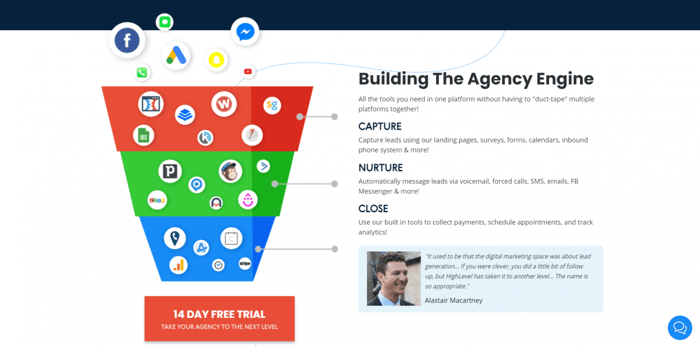
Leadpages
Leadpages offers 3 pricing plans:
1. Standard: $37/month (monthly subscription) or $27/month (annual subscription).
The Standard plan includes:
- 1 website, which you can host either on a free Leadpages domain or connect to a custom domain.
- Unlimited landing pages, pop-ups, alert bars, leads, and traffic.
- Free hosting with SSL encryption.
- Responsive site templates optimized for conversion.
- Lead notifications that enable you to track when a user responds positively to a CTA.
- Email support.
- Over 40 sales and marketing integrations.
This plan, just like the other two, includes a custom domain, but only with an annual subscription.
2. Pro: $79/month (monthly subscription) or $59/month (annual subscription).
The Pro plan includes the following features:
- The same from the previous plan plus 3 websites and chat support in addition to email support.
- Online sales and payments powered by Stripe, which means if you plan on using Leadpages for more than just building landing pages, then this is the plan to go with.
- A/B split-testing, which enables you to test out more versions of a page and choose the one that converts best.
- Email trigger links, which make signing up more than once unnecessary.
- 10 opt-in campaigns, a chance to grow your contact list through SMS, which is very useful to owners of brick-and-mortar businesses.
3. Advanced: $321/month (monthly subscription) or $239/month (annual subscription).
The advanced plan includes:
- Everything from the previous plan, only more of it: 50 websites, and priority phone support.
- Advanced integrations like HubSpot, Salesforce, and Marketo.
- 5 Pro sub-accounts for your team members or your clients.
- 50 opt-in campaigns in addition to the regular 10, connected to the 5 sub-accounts.
- 1-on-1 quick start call, which is basically an onboarding call with a Leadpages expert who will help you get off on the right foot.
The same as HighLevel, Leadpages offers a 14-day free trial – credit card required. Interestingly, we found reports of users getting their money back for various reasons even after the trial period. However, I wouldn’t count on that.
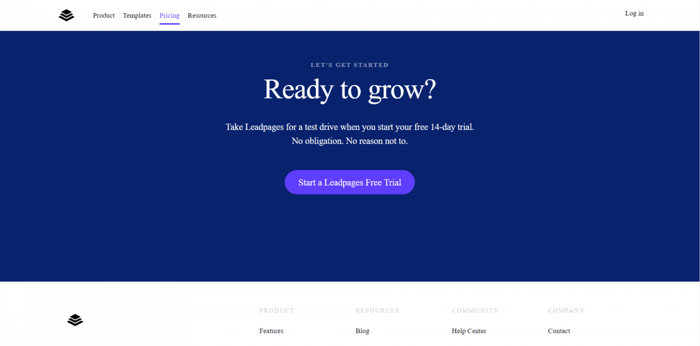
Notable Features
HighLevel
There are many important HighLevel features that we still haven’t mentioned. While we’re doing that, keep in mind that HighLevel is a highly integrated platform and the majority of the software was developed by its own team of developers. As a rule, this is much better than combining diverse types of software since it tends to be less buggy and less prone to software conflicts.
Now, let’s see some of the notable features that HighLevel provides its customers with:
- Drag-and-drop funnel, website, and page builder.
- Native booking and scheduling functionality.
- Email, text, call, and voicemail communication.
- An AI-powered communication system that can recognize positive intentions and answers on the leads’ side and act accordingly.
- Membership areas.;
- Pipelines and pipeline reporting.
- White labeling that allows you to offer the HighLevel software as your own.
- Account snapshots/templates built for various industries.
- Smart marketing campaigns, so when your lead responds to a message, they won’t receive any more messages. Instead, they’ll be transferred to the next stage or, depending on the nature of their response, to another marketing campaign.
- Ability to import a site, page, or a funnel built on ClickFunnels.
- Analytics and robust reporting on lead conversion, lead activities, and much more.
- Reputation management, meaning all the mechanisms that influence users to view a company or brand in a certain way.
- Chat widget.
- Two-way communication, no matter the type of device.
- Follow-up campaigns.
- Trigger links.
- Broadcast messaging, which means that you can send a message to many leads at the same time.
- Ability to import contact lists from other platforms to HighLevel and export from HighLevel to another platform.
- Call history and detailed call information.
- Forced calls, which enable you to automate calls to new leads.
- Real-time notifications about leads’ interaction with your clients’ sites.
- Great affiliate program.
- Integrations: Stripe, Facebook, Google, ManyChat, QuickBooks, Zoom, ActiveProspect, and those available via Zapier.
There aren’t as many integrations compared to some other popular sales and marketing platforms, but Zapier saves the day. However, you’re not limited to Zapier and the aforementioned apps. HighLevel allows for the ability to integrate other third-party software through an embed code.
For instance, since blogs play such a prominent role in today’s businesses, agency owners often need to add a blog to their customers’ sites. Since the clients deserve only top-of-the-line software, the best way to blog on HighLevel is to add a DropInBlog embed code. Thanks to the flexibility of HighLevel and the fact that DropInBlog is compatible with so many platforms out there, users can enjoy a great sales and marketing platform and excellent blogging software all at once.
Leadpages
As we said earlier, and we cannot stress this enough, Leadpages is not an all-in-one sales and marketing platform. You should be taking this into account when evaluating the platform against the tools it offers compared to a platform like HighLevel.
However, despite this, there’s still a good deal of overlap between the types of tools these two platforms include. Let’s have a look at some significant Leadpages features:
- Analytics that are updated in real-time.
- Leadpages Checkouts powered by Stripe.
- Split-testing.
- Fast page-load time and reliable hosting as a result of the platform running on Google App Engine.
- Customizable pop-ups and alert bars. Unfortunately, the pop-ups are incompatible with mobile devices, unlike the alert bars, which are mobile-friendly.
- Opt-in forms sent through SMS messages.
- Leadmeter, one of the most important Leadpages tools, whose job is to analyze pages in real-time, predict their future performance in the lead conversion context, and suggest how to make them even better for high conversion rates.
- Adjustable SEO: easy-to-edit metadata fields, auto-generated sitemaps, SEO-friendly templates, and more.
- Easy-to-use drag-and-drop editor.
- Lead notifications.
- Countdown timers and other widgets.
- Email trigger links.
- Icon library.
- Shutterstock premium images.
- Customizable responsive templates.
- Custom code editing.
- Calendly.
- Standard, advanced, and Zapier integrations, plus the possibility to add third-party software via embed codes. Similar to HighLevel, you can add a blog to Leadpages in a very convenient no-hassle way, thanks to this option.
- GDPR compliance.
Customer Support
HighLevel
Based on our personal experience and the experience of a host of reviewers, HighLevel provides world-class support. Its customer service team is available 24/7 and they are always professional and quick to help.
The platform offers help to its customers in various ways:
- Support Portal, that is, a documentation page with onboarding videos and articles on any topic related to the platform: funnels, pipelines, integrations, scheduling, listings, forms, and much more.
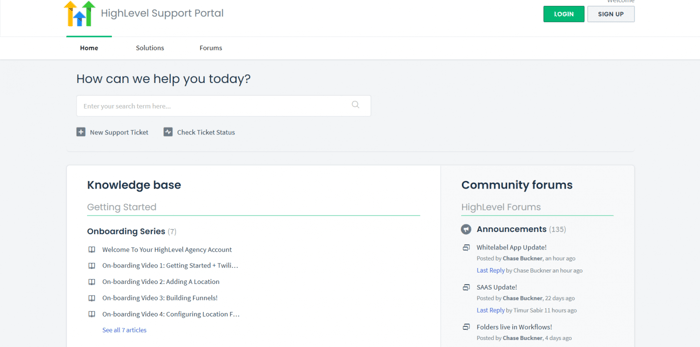
- Ticket system, which allows you to create tickets and track your ticket history from the documentation page.
- Facebook community, where you can connect with other HighLevel users and share thoughts and experiences.
- Community forums, with different announcements and popular topics.
- Email.
- Phone.
- Live chat.
- The possibility for any visitor to submit a question by clicking on something that looks like a chat icon.
Leadpages
Leadpages' customer service is one of the most respected facets of the company.
Leadpages provides customer support through:
- Email – you can fill out and submit a support request. The team usually replies promptly and it generally doesn’t take more than 48 hours for a more serious issue to be resolved.
- Help Center or Knowledge Base page, where customers can find answers to numerous questions related to the platform, like how to build a page/website with the Leadpages builder, what sorts of third-party software integrates with Leadpages, analytics, etc.
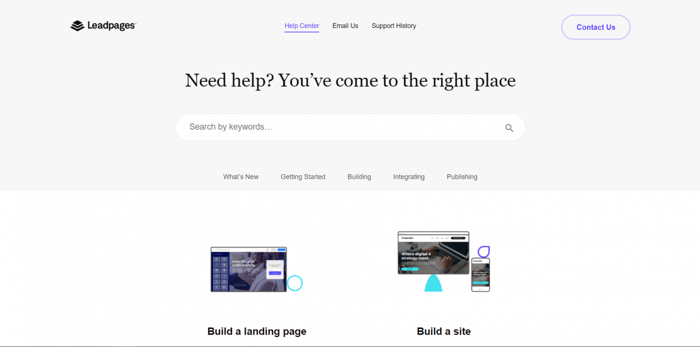
- Live Chat, available during business hours (Central Time) with the higher-tier plans.
- Phone, the same as live chat.
The customer service staff is helpful, proactive, professional, and friendly.
Conclusions
This was our short HighLevel vs. Leadpages comparison. To summarize:
- The two platforms are meant to be used in completely different ways: HighLevel as a stand-alone comprehensive sales and marketing platform geared primarily toward agency owners, while Leadpages is used as part of a larger sales and marketing strategy with the narrow goal of enabling business owners to achieve higher conversion rates.
- Despite being different, both platforms operate in the same sales and marketing arena, so it makes sense not just to compare them, but to wonder which one would work better for your business.
- Leadpages is cheaper than HighLevel, which makes sense considering that it's a much smaller platform.
- There’s a general agreement that, considering to the quality and quantity of what it offers – for instance, unlimited client accounts for no added fee – HighLevel is an exceptional value for the money.
- Both platforms provide high-quality customer service.
So, if you’re not an agency owner and you’re already using different platforms for sales and marketing purposes, Leadpages can be an excellent addition to your assortment of tools. Otherwise, you can’t go wrong with HighLevel, especially if you’re fed up with another all-in-one platform and you want something new and innovative.

